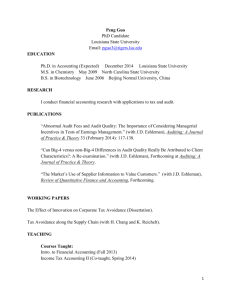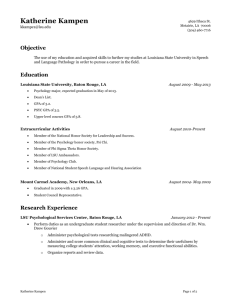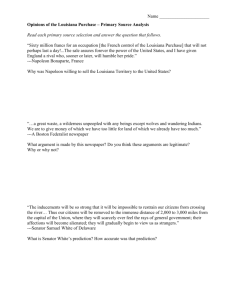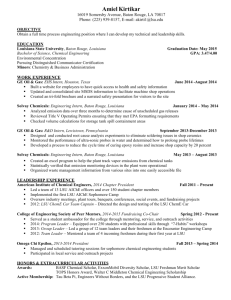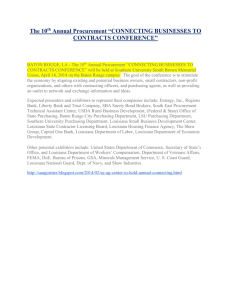LSU white paper - Southeastern Universities Research Association
advertisement
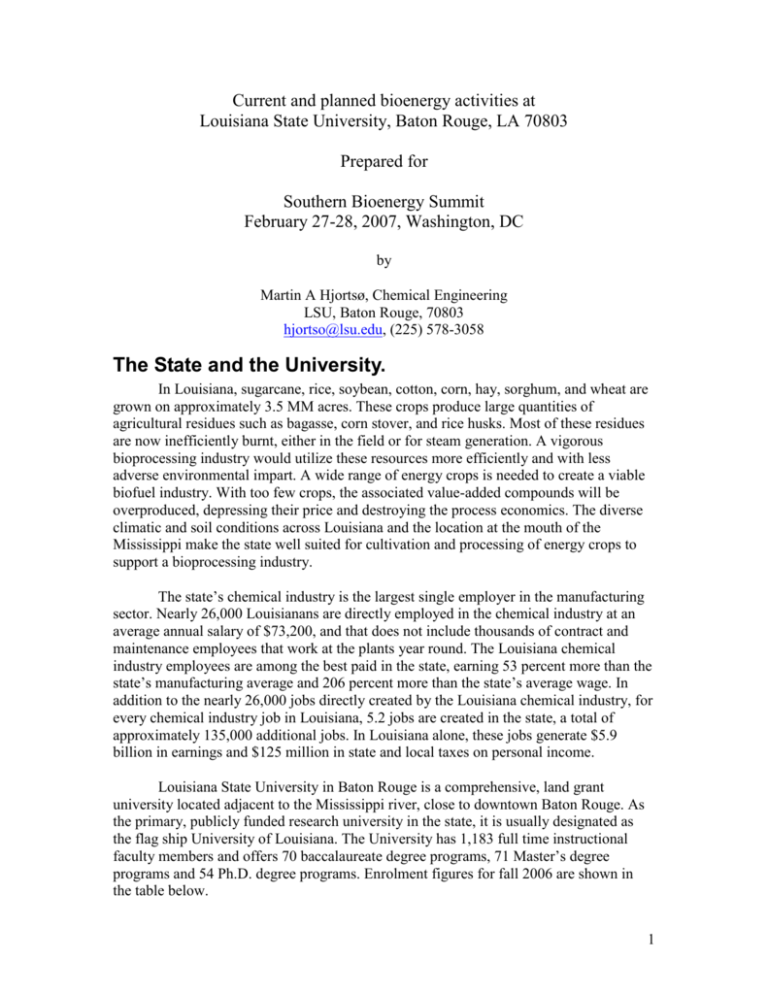
Current and planned bioenergy activities at Louisiana State University, Baton Rouge, LA 70803 Prepared for Southern Bioenergy Summit February 27-28, 2007, Washington, DC by Martin A Hjortsø, Chemical Engineering LSU, Baton Rouge, 70803 hjortso@lsu.edu, (225) 578-3058 The State and the University. In Louisiana, sugarcane, rice, soybean, cotton, corn, hay, sorghum, and wheat are grown on approximately 3.5 MM acres. These crops produce large quantities of agricultural residues such as bagasse, corn stover, and rice husks. Most of these residues are now inefficiently burnt, either in the field or for steam generation. A vigorous bioprocessing industry would utilize these resources more efficiently and with less adverse environmental impart. A wide range of energy crops is needed to create a viable biofuel industry. With too few crops, the associated value-added compounds will be overproduced, depressing their price and destroying the process economics. The diverse climatic and soil conditions across Louisiana and the location at the mouth of the Mississippi make the state well suited for cultivation and processing of energy crops to support a bioprocessing industry. The state’s chemical industry is the largest single employer in the manufacturing sector. Nearly 26,000 Louisianans are directly employed in the chemical industry at an average annual salary of $73,200, and that does not include thousands of contract and maintenance employees that work at the plants year round. The Louisiana chemical industry employees are among the best paid in the state, earning 53 percent more than the state’s manufacturing average and 206 percent more than the state’s average wage. In addition to the nearly 26,000 jobs directly created by the Louisiana chemical industry, for every chemical industry job in Louisiana, 5.2 jobs are created in the state, a total of approximately 135,000 additional jobs. In Louisiana alone, these jobs generate $5.9 billion in earnings and $125 million in state and local taxes on personal income. Louisiana State University in Baton Rouge is a comprehensive, land grant university located adjacent to the Mississippi river, close to downtown Baton Rouge. As the primary, publicly funded research university in the state, it is usually designated as the flag ship University of Louisiana. The University has 1,183 full time instructional faculty members and offers 70 baccalaureate degree programs, 71 Master’s degree programs and 54 Ph.D. degree programs. Enrolment figures for fall 2006 are shown in the table below. 1 Enrolment, fall 2006 Total Agriculture Basic Sciences Engineering Undergraduate 24,589 1,514 1,690 2,112 Graduate 4,728 448 556 466 LSU enrolment figures for fall 2006. Total 2005-2006 expenditures in several important categories are shown below. Instruction : $208,476,348 Research : $ 118,756,310 Public Service : $38, 860,764 Scholarships and fellowships : $ 53,752,367 Relevant Units. Chemical Engineering The research expertise of the faculty covers all classical areas of chemical engineering, most of which are important to processing of biological materials. Particularly relevant research interests and expertise include fermentation kinetics, inorganic (catalytic) conversion of biomass, process design, waste management and production of value added products from plant fibers. Current funding comes from federal sources (NSF, DOE, NASA) and from industrial collaborators. The Cain Chemical engineering department received a $10MM endowment in 1997 through the generosity of one of our alumni, Mr. Gordon Cain. This endowment allowed the creation of five new Cain Chairs each valued at $2MM. One such Cain Chair is presently available which the department is dedicating towards the alternative fuels area to attract a prominent researcher to the department. The holder of this Chair will have access to the entire interest derived annually from the LSU Foundation from the investment of the $2MM. This interest can be used to support research, travel and other personnel that the Chair would attract to his/her group. In addition, the accumulated interest from this Chair since the State match will also be available to the holder of the Chair. Biological Sciences This department has several faculty members with research interests closely related to processing of biomaterials. One project is focused on insect-associated fungi and past work has resulted in the discovery of more than thirty new species of wood decay basidiomycetes and many additional species that are actually widespread in pantropical regions. From the hindgut of passalid beetles (Odontotaenius disjunctus) xylose-fermenting yeast has been isolated. It may be that the rare yeast trait of xylose fermentation is common to other woodingesting beetles and that all classes of gut organisms well-studied in termites will be shown to occur and to have similar functions in most wood-ingesting organisms. In another project, thermodynamic studies of the folding and stability of extremophilic enzymes is complemented by functional characterization in different 2 solution environments. The experience with handling and characterizing enzymes that operate under extreme conditions will be directly applicable to students engineering new cellulases. The Biological Sciences Department also has a proposal with Conoco Philips for a $210,200 project to support evaluation of algae as a biological source of renewable energy. The project includes the study of algae as a source of ethanol production and algae as a source of biomass to be fermented by other organism. LSU Agricultural Center and Research and Extension Network The LSU Agricultural Center has primary responsibilities for research and extension programs related to agricultural and forested systems throughout the state of Louisiana. A task force has been formed to develop a bio-based energy plan for the Center. At a summit meeting held in April 2006 priority areas, resource requirement of and roadblocks to development of a bio-based energy program in Louisiana were identified. The top three areas in which the LSU Ag Center should play a significant role were identified as electricity, ethanol and bio-diesel. In the ethanol area, efforts are underway in the following areas. 1) Production of an inventory list of commodities for ethanol and bio-diesel production and of personnel within the Ag Center who have an interest in or are participating in bio-based energy research and/or extension programs. 2) Identification of germplasms with high potential for ethanol production. 3) Development of technologies to optimize ethanol yields from suitable feedstock. 4) Accelerate information transfer to feedstock producers and business and financial communities. Efforts underway in the bio-diesel area include establishment of an inventory of people and resources, economic analysis and demonstration of relevant processes and equipment. The Age Center also has a strong interest in extension and outreach efforts such as public awareness programs and symposia, and in providing demonstrations on the effectiveness of biomass production. Audubon Sugar Institute The Audubon Sugar Institute, a unit within the Ag Center, has over the past two years, with significant funding from the US Department of Energy, mounted a serious research effort in the bio-based energy area. There are two routes to ethanol from sugarcane biomass: 1. The pre-treatment of bagasse, prior to hydrolysis of the fibrous material and fermentation of sugars produced to ethanol. Maximum value from bagasse can in theory be obtained by separating bagasse into its three major components, cellulose, lignin and hemicellulose; cellulose and hemicellulose are hydrolyzed, but lignin is not hydrolyzed and may be the source of other value-added products 2. Thermochemical treatment, subjecting the biomass to high temperature pyrolysis or gasification. Pyrolysis produces bio-oils and gasification produces a syngas that can be converted in a catalytic reaction to liquid fuels. Both routes are being investigated at Audubon. In addition, direct use of bagasse fiber to produce geo-textiles for erosion control is being investigated. Value-added products can be produced from sugarcane biomass but very few of these processes are economically viable. The challenge is to find those processes, which 3 when incorporated into a biorefinery, will lead to products of value that justify the capital investment. Many different schemes have been devised in the Sugar Institute. The major efforts have been directed towards pretreatment of bagasse and cane leaf matter, recovery of phenols from the lignin fraction of the biomass, optimizing the enzymatic hydrolysis for different pre-treatments, and the challenges of fermenting both glucose and pentose sugars to ethanol and other products. Additional work has been done on producing more cellobiose from hydrolysis for the production of added-value chemicals. Gasification research is at an early stage but progress will be boosted with a second graduate student next semester. A smaller program for the production of biodiesel in a modified process using bio-ethanol and not methanol is also under way. Biological and Agricultural Engineering The department has about 160 student and three faculty members with research and teaching responsibilities that relate to bio-energy. In addition, there is one extension faculty member who has primary responsibilities toward energy conservation. There are a number of projects in the bio-material area going on right now, for instance, investigation of a cross-section of technologies that relate to animal waste utilization in a bio-energy system (low-cost drying technologies for high moisture materials and gasification systems with improved ash management to name a couple), harvesting, transport, and storage of commodities in a bio-energy system and fuel cell applications. Outside funding is coming from some smaller sources (mostly in-state and commodity groups) right now. Center for Energy Studies The Center for Energy Studies is an interdisciplinary research unit focused on energy policies and issues that are important to Louisiana. Its research faculty and staff include economists, engineers, geographers, geologists, librarians and information specialists. In the fall of each year the Center convenes an Energy Summit on conventional energy issues and in the spring holds a parallel conference on alternative energy. The Center is working with the Departments of Chemical Engineering and the Department of Biological & Agricultural Engineering to develop an interdisciplinary effort to take advantage of the intellectual and analytical resources of the University to develop and promote biofuels and bioenergy industries in the state. The premise is that Louisiana has unique, but not well recognized, advantages that can be exploited to improve the State’s economic performance, reputation and prospects. In brief: o Biofuels will not be substitutes for but supplements to conventional oil and gas and will have to be integrated into the existing production, refining and distribution system that is concentrated in Louisiana. o A large proportion of the Nation’s corn crop comes down the Mississippi River and some Louisiana crops are potential sources for biofuels. o High energy prices made parts of the State’s petrochemical complex uneconomic; biofuels may provide new feed stocks/products/jobs for these, existing, old, unused plants. The focus of the effort is the shorter-term, applied aspects of integrating larger volumes of biofuels into the existing industrial infrastructure, rather than more basic, longer-term research focus of most universities and federal programs. The Center’s 4 contribution to the effort would be the analysis of economic and public policy issues involved in more intensive and wider spread biofuels production and use. Shaw Group Research Center The Shaw Group has announced plan to construct a commercial scale bio-refinery on the west bank of the Mississippi river, across from Baton Rouge. Initial discussions have been held with LSU about the possibility of building a Biofuels Research Center next to this plant. The Research Center would test and conduct research for the biofuels complex as well as similar facilities on a non-proprietary basis. The Center would have the ability to test biofuels technology and equipment on a commercial rather than merely bench scale basis. Fuels and materials for the facility and test products could be furnished and returned to the commercial biofuels complex on a cost or avoided cost basis. Such a university-based cooperative venture with an established Fortune-500 company would furnish visibility and credibility to both the biofuels industry and Louisiana’s efforts to assume a position of biofuel leadership. Collaborative efforts with DuPont. Efforts are underway to establish collaboration between researchers at LSU and the biofuels group at DuPont. A meeting has been set up for March 26 2007 to discuss various research possibilities. 5
